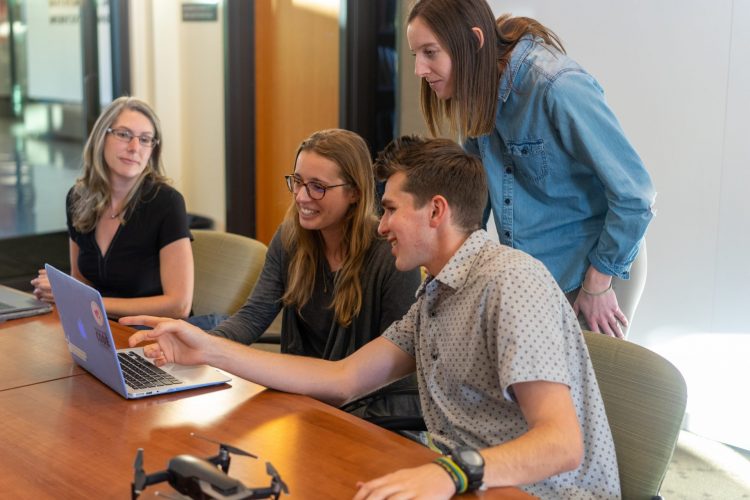In your studies, it is often not only your own skills that are required, but one thing above all: social skills. The ability to pursue a common goal with others and to bring projects to a conclusion will be demanded of you again and again in life. This makes group work during your studies an important preparation for your future job. But group work is not only about your future career. You can benefit enormously from successful group work, for example, when preparing for an oral exam or if you suffer from exam nerves – provided that the work does not completely stick to you. In fact, group work can mutate into a major stress factor in your studies, and there are more than enough of those anyway. In this article, you’ll find out how to avoid this and what else is important for successful group work.
With the right team by your side, any hurdle can be overcome. But the biggest problems in group work are due to the constellation and selection of group members. It is not uncommon for group work to fail at this point. However, in order for you all to benefit from each other, you should follow these 3 tips:
You think the more people in a group, the less everyone has to work? That’s not true. Because large groups are more complicated to manage. Depending on the task, the group size should definitely not be more than 5 or 6 people. On the one hand, with even more group members it becomes difficult to divide up the individual to-dos fairly and to maintain an overview. On the other hand, the potential for conflict increases with the size of the group and that individuals no longer contribute sufficiently. In addition, meetings and joint appointments are easier to organise if a group consists of 4 to 5 people.

In a perfect group, the group members complement each other with their interests and skills. Is one person particularly good at research and the other at putting together a presentation? Very good! Then divide the tasks accordingly. If the third person likes to present, it will be easier for everyone. 3.
A well-mixed group can cope if one person is not so on the ball, needs more support or wants to set the tone all the time. But if there are several group members who stand out negatively, this can quickly become a burden for everyone else and for the outcome of your work. It is not uncommon for the group to split into two camps, making constructive cooperation impossible. So think carefully about who you want to work with in a group and who can pull together. This is especially true in cases where you choose the group yourself.
In addition to the group members, successful group work depends on a clear process. With the following tips, you’ll do everything right from the start. 1:
One group member always takes the lead. If this does not happen automatically, discuss the issue openly and decide who is suitable. The work consists in particular of keeping an eye on progress and moderating the meetings, but without letting the boss hang out. On the other hand, not everything should be left to the person! The group as a whole is needed here. If no one feels responsible for coordination, you will quickly miss the target or there will be conflicts.

Once the coordinator has been chosen, think about the scope of your group’s work. Collect all the tasks and distribute them fairly according to strengths and preferences. If no one volunteers for one or the other task, try to work out compromises. If necessary, draw lots! Also define at the same time by when you have to complete which task. The following points are essential parts of almost any group work:
The life of students is full of obligations: A part-time job during studies, but also other tasks for the university are the order of the day for many. In addition, friendships and relationships need to be maintained and then there is the household to take care of. And that goes for all group members. If you don’t plan far enough ahead, it will become more and more difficult to realise joint meetings. Accordingly, you should set your dates and milestones right at the beginning. That way, there are no more excuses and you avoid ending up with night shifts and long days – pure stress that you can save with a good schedule.
Unfortunately, reality often looks different and that is why group work does not always lead to the desired result. However, if you pay attention to the following points from the beginning, the likelihood that the cooperation will not work at all is reduced:
A common problem with groups is that not everyone approaches the work with the same motivation. While some work towards a particularly good grade, others just want to pass. Here, open communication is important to clarify intentions from the beginning and to find a consensus.
sometimes one person in the group is overzealous, wants to decide everything and dictate the course of events. This is at least as much of a hindrance to a group as those who do not feel responsible for anything or are happy to leave the work to others. Therefore, it is important to set clear rules as a group from the beginning.
a positive atmosphere in groups is a great support in your studies and helps even when you have a serious lack of motivation. It’s good if you all get along and enjoy meeting. However, the meetings should not degenerate into a coffee party. Even if the group dynamic goes in a negative direction, this paralyses cooperation. In this case, it is important to address the problem openly and listen to each other. But before you let yourself get caught up in the difficult dynamics, you should join forces with like-minded people. By the way, here are more tips for more self-motivation in your studies.
Wherever different people meet, things can get rough – even in the best teams. And especially when there is a lot of time pressure, nerves can quickly get the better of you. That’s why it’s important that you find a good basis for communication as a group, don’t take things too personally and accept each other’s weaknesses. Listen to each other and take each other’s needs seriously. Compromise and non-work events can help to smooth the waters and strengthen team spirit. Of course, it’s best if you grow together as a team from the beginning and have a strong foundation.

Everyone knows them: the slackers and freeloaders in your studies. If you notice that a group member is not contributing at all or not keeping to deadlines, you should counteract this immediately and bring it up in the group. If there is no improvement after two or three discussions, you should exclude the person from the group and inform your lecturer. This way, you will have less stress than constantly chasing the other person, only to have him or her take over the work shortly before the deadline.